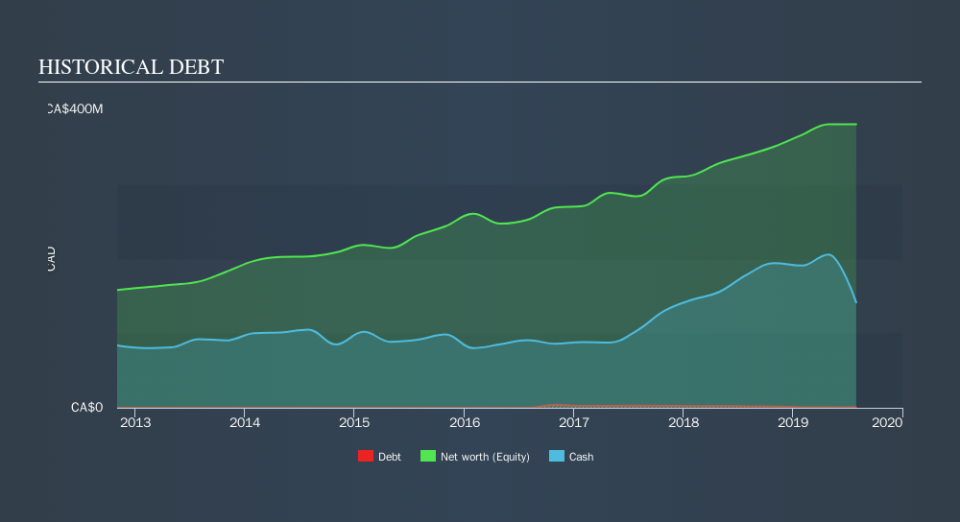Is Enghouse Systems (TSE:ENGH) A Risky Investment?

Some say volatility, rather than debt, is the best way to think about risk as an investor, but Warren Buffett famously said that 'Volatility is far from synonymous with risk. So it seems the smart money knows that debt - which is usually involved in bankruptcies - is a very important factor, when you assess how risky a company is. As with many other companies Enghouse Systems Limited (TSE:ENGH) makes use of debt. But is this debt a concern to shareholders?
When Is Debt Dangerous?
Generally speaking, debt only becomes a real problem when a company can't easily pay it off, either by raising capital or with its own cash flow. In the worst case scenario, a company can go bankrupt if it cannot pay its creditors. However, a more frequent (but still costly) occurrence is where a company must issue shares at bargain-basement prices, permanently diluting shareholders, just to shore up its balance sheet. Of course, debt can be an important tool in businesses, particularly capital heavy businesses. When we think about a company's use of debt, we first look at cash and debt together.
View our latest analysis for Enghouse Systems
What Is Enghouse Systems's Debt?
You can click the graphic below for the historical numbers, but it shows that Enghouse Systems had CA$738.0k of debt in July 2019, down from CA$1.99m, one year before. However, its balance sheet shows it holds CA$141.3m in cash, so it actually has CA$140.6m net cash.
How Healthy Is Enghouse Systems's Balance Sheet?
The latest balance sheet data shows that Enghouse Systems had liabilities of CA$163.7m due within a year, and liabilities of CA$31.4m falling due after that. Offsetting this, it had CA$141.3m in cash and CA$81.0m in receivables that were due within 12 months. So it actually has CA$27.3m more liquid assets than total liabilities.
Having regard to Enghouse Systems's size, it seems that its liquid assets are well balanced with its total liabilities. So it's very unlikely that the CA$1.98b company is short on cash, but still worth keeping an eye on the balance sheet. Simply put, the fact that Enghouse Systems has more cash than debt is arguably a good indication that it can manage its debt safely.
Fortunately, Enghouse Systems grew its EBIT by 9.4% in the last year, making that debt load look even more manageable. There's no doubt that we learn most about debt from the balance sheet. But it is future earnings, more than anything, that will determine Enghouse Systems's ability to maintain a healthy balance sheet going forward. So if you want to see what the professionals think, you might find this free report on analyst profit forecasts to be interesting.
Finally, a company can only pay off debt with cold hard cash, not accounting profits. Enghouse Systems may have net cash on the balance sheet, but it is still interesting to look at how well the business converts its earnings before interest and tax (EBIT) to free cash flow, because that will influence both its need for, and its capacity to manage debt. Over the last three years, Enghouse Systems actually produced more free cash flow than EBIT. That sort of strong cash conversion gets us as excited as the crowd when the beat drops at a Daft Punk concert.
Summing up
While it is always sensible to investigate a company's debt, in this case Enghouse Systems has CA$140.6m in net cash and a decent-looking balance sheet. The cherry on top was that in converted 117% of that EBIT to free cash flow, bringing in CA$82m. So is Enghouse Systems's debt a risk? It doesn't seem so to us. We'd be very excited to see if Enghouse Systems insiders have been snapping up shares. If you are too, then click on this link right now to take a (free) peek at our list of reported insider transactions.
If, after all that, you're more interested in a fast growing company with a rock-solid balance sheet, then check out our list of net cash growth stocks without delay.
We aim to bring you long-term focused research analysis driven by fundamental data. Note that our analysis may not factor in the latest price-sensitive company announcements or qualitative material.
If you spot an error that warrants correction, please contact the editor at editorial-team@simplywallst.com. This article by Simply Wall St is general in nature. It does not constitute a recommendation to buy or sell any stock, and does not take account of your objectives, or your financial situation. Simply Wall St has no position in the stocks mentioned. Thank you for reading.

 Yahoo Finance
Yahoo Finance 
